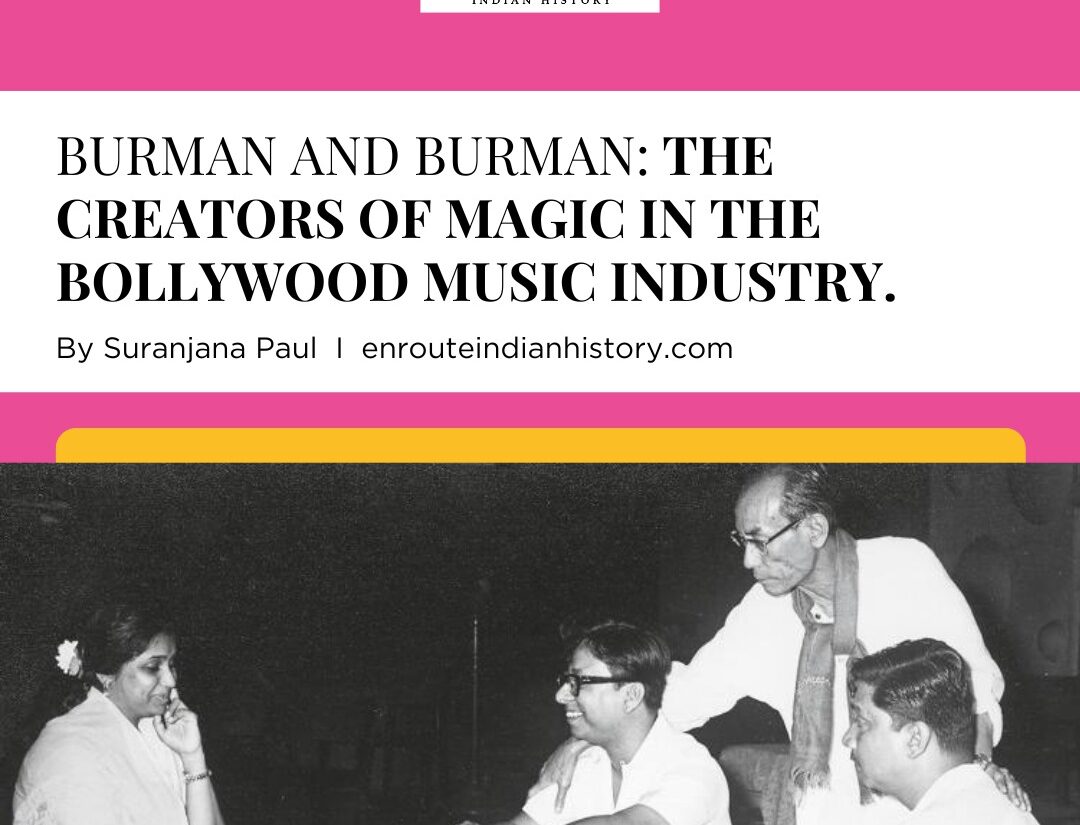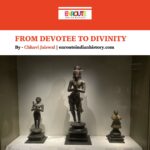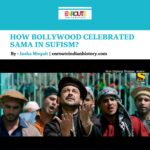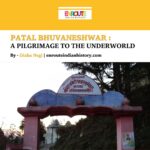Burman and Burman: The Creators of Magic in The Bollywood Music Industry.
- EIH User
- June 27, 2024


(Source: The Wire)
Burman and Burman: The Creators of Magic in The Bollywood Music Industry.
First Talkies cinema was produced in India in the year 1933 which not only introduced the dialogue in the film but also added a new genre in Indian culture as well as film, it was the music and this music had created a large industry along with the Film industry. However the film industry was set up in cities like Lahore and Calcutta, and ultimately it shifted to Bombay which is presently known as Mumbai. Most importantly, the Mumbai film industry was able to make a stronghold in the music industry by composing popular music from the pre-independence era, whereas other film cities also had created popular music, still Mumbai had a special importance in this sector. So many popular music composers and singers worked in the Mumbai film industry along with other industries and some of them also permanently settled in Mumbai. From the Bengali film industry, Sachin Dev Burman, Salil Chowdhury, Hemanta Mukherjee, and Manna Dey have worked in the Mumbai film industry along with other industries. Even Sachin Dev Burman had shifted to Mumbai for the music.
The Father-Son Duo:
Indian Classical to Western music, devotional to sufi, regional folk to jazz all kinds of music from different parts of India and the World have amalgamated in the Mumbai music industry. Sachin Dev Burman and his son Rahul Dev Burman also merged different kinds of tunes and music in their compositions, even R D Burman was also influenced by his father. For the Amar Prem movie, he composed the song Raina Beeti Jaye, which was inspired by Sachin Dev Burman’s old Bengali song Bela Boye Jaye. He also used two different ragas for this song, one of the ragas was Todi, a morning raga and another was raga Khamaj, the late-night raga. Even R D Burman was influenced by his father’s meter or chanda which S D Burman composed in his earlier works, such as, R D Burman composed the famous song Saagar kinare for the movie Saagar which meter is influenced by S D Burman’s song Thandi Hawayen from the movie Naujawan and both songs are sung by Lata Mangeshkar. In the song Saagar kinare Lata Mangeshkar has sung with Kishore Kumar. Despite the influence of his father, there was a difference in this father and son’s style. While S D Burman was a minimalist, R D Burman crafted his music by building a brand that was based on bossa nova, folk, jazz, blues, and also Indian classical music. R D Burman also worked as an assistant music composer in several popular films where his father, S D Burman was the music composer including Chalti Ka Naam Gaadi, Kaagaz Ke Phool, Jewel Thief, Aradhana, Prem Pujari, and others and he also played harmonica in his father’s orchestras. R D Burman played the mouth organ in the popular song ‘Hai Apna Dil To Aawara’ which was composed by his father S D Burman and sung by Hemanta Mukhopadhyay and featured in the movie Solva Saal.

Sachin Dev Burman and Rahul Dev Burman
(Source: India Today)
R D Burman and his music:
R D Burman’s solo journey started with the film Chhote Nawab but he achieved fame from the film Teesri Manzil. In this film, he composed the song Deewana Mujhsa Nahin which was influenced by a Nepali song Ae Kanccha, and the song was based on the folk tune. R D Buman was not only inspired or influenced by oriental folk but also deeply influenced and inspired by Western music. Even some of his compositions are very similar to some Western songs. He composed the song ‘Aao twist karein’ in the film Bhoot Bangla which was inspired by the song ‘Let’s twist again’ by Chubby Checker. Another example is also found in the movie Parinda, where the song Tumse Milke had used and this song was composed by R D Burman and sung by Asha Bhosle and Suresh Wadkar and this song is also inspired by Leo Sayer’s ‘When I Need You’. The song Chura Liya Hai which was used in the movie Yaadon Ki Baaraat, the tune was inspired by ‘If it’s Tuesday it must be Belgium’ from the movie of the same name. For the prelude of the song he actually used a glass that was stuck by a spoon along with the twelve-string guitar. He was also influenced by Persian artist Zia Atabi’s ‘Heleh Maali’ and created the popular song Jahan teri yeh nazar hai on the influence of the Heleh Maali, this Hindi song was featured in the movie Kaalia and sung by Kishore Kumar. R D Burman was not only influenced or inspired by regional folk or Western or Persian music but also he was deeply influenced by Indian classical music. He merged notes of raga Khamaj into raga Kalavati in the song Kuchh toh log Kahenge which was used in the movie Amar Prem. For the same movie, he composed the song Bada Natkhat Hai Re based on the raga Khamaj. He also used raga Khamaj for Aayo Kahan Se Ghanshyam and Jiya Na Lage Mora and both of these songs were featured in the movie Buddha Mil Gaya. R D Burman who is also known as Pancham, used several instruments from different parts of the world along with Indian instruments. His composed music is not only music, they are amalgamations of World music.
S D Burman and His Music:
Sachin Dev Burman was a very rooted person which is reflected in his music compositions. He was brought up in Comilla, present in Bangladesh where he attached with the root and later he carried all tunes through his creations. He was very much influenced by various Bengali folks, such as the song Sun mere bandhu re from the film Sujata and the song Mere sajan hai us paar from the film Bondini are the boatman songs, and both the songs are sung by himself. He also adopted the famous Bengali folk Allah Megh De Paani De according to the film Guide and used it in the film. Even the Bengali folk trait is found in the song Wahan Kaun hai Tera Musafir Jayega Kahan from the movie Guide. For the film Pyaasa, he composed the song Aaj sajan mohe ang laga le, is a traditional bhajan composition and this song was written by Sahir Ludhianvi. Hindustani classical music is also present in his composition list. The song Mohse chhal kiye ja which was featured in Guide film had played tabla by Santoor maestro Pandit Shiv Kumar Sharma. Sachin Karta was also influenced by Rabindra Sangeet. He created some music under the shadow of Rabindra Sangeet, among them Tere Mere Milan Ki Yeh Raina is the most popular one which was used in Abhimaan film and sung by Kishore Kumar and Lata Mangeshkar and this song was inspired by Jodi tare naai chini. For the film Jewel Thief, he composed the song Raat akeli hai, bujh gaye diye which is based on the Western form and this song is quite different from his style. His compositions were the merger of different kinds of regional folk forms and Indian music forms.
Both Burmans worked with several artists, lyricists, and producers and created magic in the Hindi film and music industry. Along with the compositions, they were great singers. Their works are still listened to by the younger generation along with the elders. Even in the film Chup, the song Ye Duniya Agar Mil Bhi Jaye from Pyaasa was used and this song was also composed by Sachin Dev Burman.

(Source: The Wire)
Reference:
Arora, P., 2022. Time Theory in Relation to Music. SUBSCRIPTION RATES, p.16. Available from:https://ejournal.music.du.ac.in/pdf/e-journal/Vageshwari%20Vol%20XXXVI.pdf#page=30. [Accessed 22 June 2024]
Bhaduri, A., 2014. RD Burman and Raga Khamaj. The Times Of India. 3 July 2014. Available from: https://timesofindia.indiatimes.com/blogs/just-like-that/rd-burman-and-raga-khamaj/?source=app&frmapp=yes. [Accessed 22 June 2024]
Mander, H., 2018. S.D. Burman, the Man Who Gave Hindi Film Music Its Grammar. The Wire. 28 June 2018. Available from: https://thewire.in/books/sd-burman-book-review. [Accessed 22 June 2024]
Daniyal, S., 2015. From Karbala to Dev Anand: The story of the much-travelled ‘Allah Megh De’. Scroll. 28 November 2015. Available from: https://scroll.in/reel/800318/from-karbala-to-dev-anand-the-story-of-the-much-travelled-allah-megh-de. [Accessed 22 June 2024]
The Economic Times. 2018. Music, Love & More: A Tribute To India’s Melody Maestro RD Burman On 80th Birth Anniversary. 27 June 2018. Available from: https://m.economictimes.com/magazines/panache/on-rd-burman-79th-birth-anniversary-heres-a-look-at-his-life-in-pictures/the-masters-at-work/slideshow/64759677.cms. [Accessed 22 June 2024]
Gaekwad, M., 2017. S.D. Burman: the maverick and his music. The Hindu. 25 November 2017. Available from: https://www.thehindu.com/entertainment/movies/sd-burman-the-maverick-and-his-music/article20762742.ece. [Accessed 22 June 2024]
The Daily Star, 2009. Sachin Dev Burman: Epitomising the East Bengali lilt. The Daily Star. 30 October 2009. Available from: https://www.thedailystar.net/news-detail-111978. [Accessed 22 June 2024]
- Bollywood folk music Burman
- Bollywood music legends Burman
- Burman Bollywood music history
- Burman contributions to Bollywood
- Burman father-son duo music
- Iconic Bollywood music composers Burman music in Hindi cinema
- R.D. Burman Bollywood hits
- R.D. Burman innovative music
- R.D. Burman jazz influence
- S.D. Burman and R.D. Burman songs
- S.D. Burman Bollywood music
- S.D. Burman Indian classical music

















